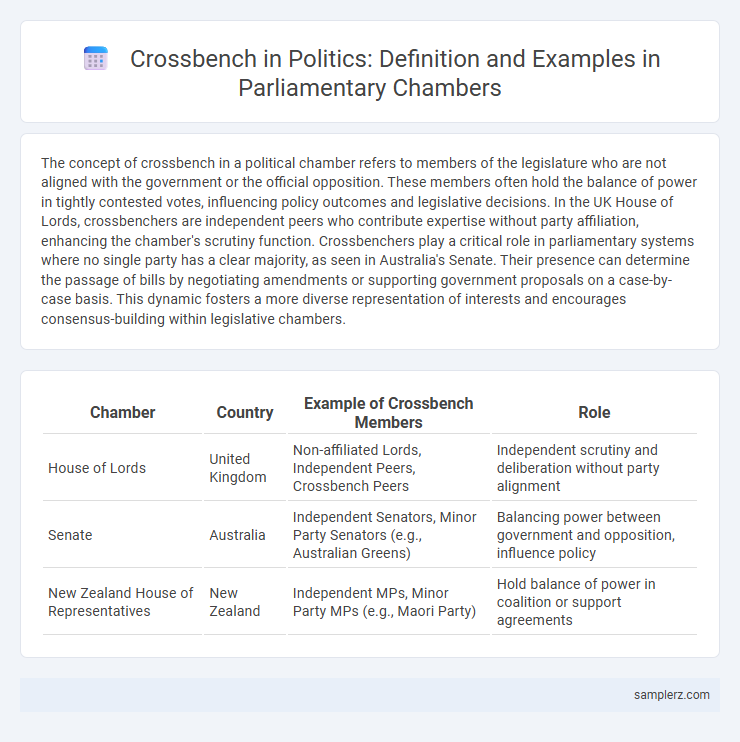The concept of crossbench in a political chamber refers to members of the legislature who are not aligned with the government or the official opposition. These members often hold the balance of power in tightly contested votes, influencing policy outcomes and legislative decisions. In the UK House of Lords, crossbenchers are independent peers who contribute expertise without party affiliation, enhancing the chamber's scrutiny function. Crossbenchers play a critical role in parliamentary systems where no single party has a clear majority, as seen in Australia's Senate. Their presence can determine the passage of bills by negotiating amendments or supporting government proposals on a case-by-case basis. This dynamic fosters a more diverse representation of interests and encourages consensus-building within legislative chambers.
Table of Comparison
| Chamber | Country | Example of Crossbench Members | Role |
|---|---|---|---|
| House of Lords | United Kingdom | Non-affiliated Lords, Independent Peers, Crossbench Peers | Independent scrutiny and deliberation without party alignment |
| Senate | Australia | Independent Senators, Minor Party Senators (e.g., Australian Greens) | Balancing power between government and opposition, influence policy |
| New Zealand House of Representatives | New Zealand | Independent MPs, Minor Party MPs (e.g., Maori Party) | Hold balance of power in coalition or support agreements |
Understanding Crossbench: Definition and Role in the Chamber
Crossbench members in a legislative chamber refer to independent or minor party representatives who do not align with the government or official opposition. These parliamentarians play a pivotal role in balancing power, often swinging votes on key legislation and fostering bipartisan dialogue. Their presence ensures diverse opinions and can influence policy outcomes by supporting or challenging the dominant political factions.
Historical Evolution of the Crossbench in Politics
The historical evolution of the crossbench in politics reflects its role as a pivotal space for independent and minor party members who resist traditional party alignment, notably emerging in the British House of Lords during the 19th century. Crossbenchers have historically contributed to legislative balance by providing non-partisan expertise and acting as swing votes in closely divided chambers, as seen in Australia's Senate reforms of the 1970s. This evolution highlights the increasing institutional recognition of political diversity beyond the major parties, influencing democratic deliberation across multiple parliamentary systems.
Notable Examples of Crossbenchers in Recent Sessions
Crossbenchers such as former Australian senator Jacqui Lambie have played a pivotal role in swaying legislative outcomes in recent sessions by holding the balance of power. Independent senator Rex Patrick consistently influences debates, representing South Australian interests and scrutinizing government policies. Prominent figures like Senator Nick McKim of the Greens also exemplify crossbench impact, advocating for environmental and social reforms.
Impact of Crossbench Votes on Key Legislation
Crossbench votes in parliamentary chambers often determine the fate of crucial bills by tipping the balance between major parties. Their support or opposition can influence policy outcomes in areas such as healthcare reform, environmental regulations, and budget allocations. Understanding the strategic role of crossbenchers is essential for predicting legislative success and government stability.
Crossbench Alliances: Case Studies from the Chamber
Crossbench alliances in parliamentary chambers often emerge when independent or minor party members collaborate to influence legislative outcomes, as seen in the Australian Senate where crossbenchers hold balance-of-power positions. The UK House of Lords contains a substantial number of non-affiliated peers who form crossbench groups, leveraging their independence to scrutinize government bills impartially. In New Zealand's Parliament, crossbench members from diverse minor parties frequently negotiate alliances to support or oppose coalition governments, significantly shaping policy decisions.
Balancing Power: Crossbench Influence in Government Decisions
Crossbenchers in parliamentary chambers often hold the balance of power, particularly in closely contested legislatures such as the Australian Senate or the UK's House of Lords. Their pivotal role enables them to influence government decisions by negotiating amendments and extracting concessions from major parties. This strategic positioning ensures that minority interests are represented, promoting more inclusive and accountable policymaking.
Challenges Faced by Crossbench Members in the Chamber
Crossbench members in the chamber often face challenges such as limited access to party resources and reduced influence in legislative negotiations, hindering their ability to shape policy effectively. Their diverse ideological backgrounds can complicate forming consistent voting blocs, making it difficult to leverage collective power against major party agendas. Navigating these obstacles requires strategic alliances and exceptional negotiation skills to ensure their views are represented in parliamentary debates and decisions.
Crossbench Contributions to Parliamentary Debates
Crossbench members in the chamber provide pivotal contributions to parliamentary debates by offering independent perspectives that often bridge partisan divides. Their interventions enhance legislative scrutiny by emphasizing pragmatic solutions and scrutinizing government policies without party allegiance. This dynamic fosters balanced discourse and can influence the passage of nuanced legislation.
Role of the Crossbench in Upholding Political Accountability
The crossbench in political chambers serves as a crucial check on government power by scrutinizing legislation and holding the executive accountable through rigorous debate and question periods. Independent and minor party members on the crossbench often hold the balance of power, enabling them to influence policy outcomes and ensure transparency. Their presence promotes a more balanced and accountable political environment by preventing dominance from major parties and encouraging diverse viewpoints.
Future Trends: The Growing Importance of the Crossbench
The increasing presence of crossbench members in legislative chambers reflects a shift toward multiparty collaboration and nuanced policymaking. Future trends suggest these independents and minor party representatives will play pivotal roles in shaping legislation by providing essential swing votes and diverse perspectives. Their growing influence challenges traditional party dominance, fostering more balanced and representative governance.

example of crossbench in chamber Infographic
 samplerz.com
samplerz.com